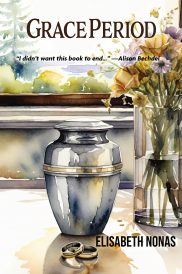 By Elisabeth Nonas
By Elisabeth Nonas
Special to Lesbian.com
Just as 70-year-old writing professor Hannah Greene walks into her retirement party, she’s called to the ER because Grace, her wife of 25 years, has been in what turns out to be a fatal car accident. This was definitely not part of the plan the two had for their lives, especially since Grace was ten years younger than Hannah. The plan had been for Hannah to join her art history professor wife on a sabbatical trip to Europe. Grace would do research, and Hannah would figure out what she wanted to do in her retirement.
How does an independent, feisty lesbian adjust to both her suddenly widowed and newly retired life? How can she survive the loss of the spouse who statistically should have survived her?
Grace Period tackles these questions head-on in an intimate, witty portrayal of a woman grappling with the new and unexpected turn her life has taken. It is a tale of love, loss, and survival.
Girl Leslie and I would spend the day lying by the pool.
She and I had very different MOs. I’d wear a baseball cap and read a book or the trades. Girl Leslie would lie perfectly still, eyes closed, adjusting the angle of her chaise to follow the sun. At the end of the first day we’d done this, I compared my arm to hers. “You’ve got this golden glow, and I look like I’ve spent all my time inside,” I complained.
“You were reading,” Leslie said.
“What?”
“You need to focus.”
“The sun didn’t know I was reading.”
She tilted her head toward her tanned arm and my pale one. “I’m just saying.” “Well, that’s ridiculous.”
Over time, I accepted the inferior results of my bronzing technique. I enjoyed the weekends we spent in the desert. When it was just the three of us, my two Leslies and me, we’d all have dinner together, then Boy Leslie would go back to his writing, and Girl Leslie and I would go out dancing. Remember, this was back when there actually were lesbian bars. The ‘80s were lively, with lots of partying. Often chemically enhanced. Personally, I liked cocaine or quaaludes. Coke let you feel in charge and in control. My first agent described its industry-wide popularity this way: “L.A. is a town that makes you feel bad about yourself. Cocaine is a drug that makes you feel good about yourself.” Quaaludes were entirely different. The right amount loosened you up, let you slip inside the music, move along with it. I never understood the attraction to amyl nitrate. Poppers made my heart race, my pulse pound. I hated that feeling. And they left me with a splitting headache. Plus, they smelled like a locker room. A stuffy locker room. A stuffy boys’ locker room. But to each her own.
One crazy evening, eight of us down from L.A. had arranged to meet up at a bar. Our friend Emily was going through a breakup, and we were determined to cheer her up with an evening of dancing.
For the record, I never dated anyone I’d met in a bar. Probably because I’d never met anyone in a bar. Never picked anyone up, never even recognized if someone was hitting on me. So I don’t know why I went. Or why, when I did, I felt this anticipation that something might happen. Maybe it was just seeing all those women in one place. Back then, both here in the desert and up in L.A., lesbians were invisible most of the time, whether in or out of the closet. Going about our lives under cover during the day, definitely not a critical mass. But at night, in the bars, we saw each other. Each venue became ripe with possibility and promise.
But did I really think I’d meet someone there? Did I believe deep down? No. I just loved being around all those women. And I did love to dance.
That night in the desert, we did our best to bolster Emily’s spirits. We danced as one big group. After a while, I was sweaty and needed a break. I stood by the edge of the dance floor. A sweet-looking young woman a few feet from me motioned to a couple dancing right in front of her. She said something to me that was impossible to hear over the pounding music, so I simply answered with a nod-laugh, like I knew what she meant.
Then Emily came over. Rather, our friends AJ and Jen dragged Emily, an arm draped over each of their shoulders, to me. “I have to go home,” Emily told me. “I don’t want to go home. But I don’t have any bones.”
Ah, quaaludes. While the right amount loosened you up, too much turned you to rubber.
By this time, leaving seemed like a good idea to me, too. AJ said they could drop me off, so I looked for Girl Leslie and spotted her dancing with a tall, athletic woman she’d been eyeing since we arrived. I gave Girl Leslie the sign that I was ready to head out. She spoke into her dance partner’s ear and then came over to me.
“AJ’s giving me a ride home,” I said, handing Girl Leslie my car keys.
“Thanks. I’ll stay and get to know Tanya better,” Girl Leslie said, waving at the woman who hadn’t stopped dancing but waved back.
“I’ll bet you will,” I smiled, waving to Tanya.
Girl Leslie punched my arm.
Outside, I breathed in the quiet of the desert night after the pulsing of the loud music. My head felt encased in a pillow. As always, I experienced a twinge of regret at leaving before something good happened. Even though I knew it never would.
For more information, please visit elisabethnonas.com.






